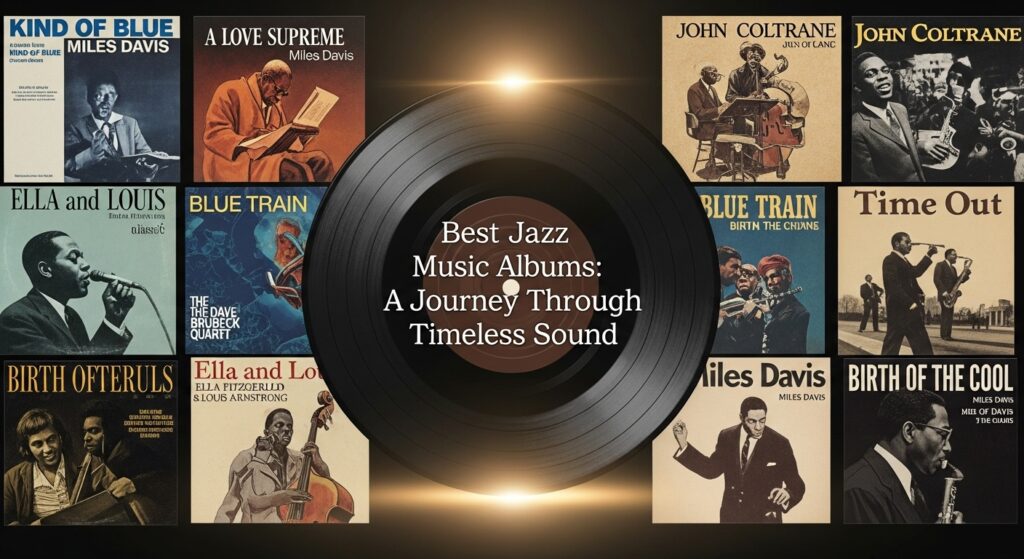In today’s fast-paced musical world, where digital playlists and instant streaming dominate, one genre continues to stand as a beacon of artistry and expression: jazz. Known as the “music of freedom,” jazz is more than a genre—it’s a living dialogue of improvisation, rhythm, and soul. While countless records have been released, some stand apart as the best jazz music albums, shaping not only the genre but also music history at large.
This article explores the albums that defined jazz, their impact on culture, and why they remain essential listening for both longtime enthusiasts and newcomers eager to understand the magic of jazz.
What Defines the Best Jazz Music Albums?
The best jazz music albums are not just collections of songs; they are complete works that capture the spirit of innovation and collaboration. These albums often share three qualities:
-
Musical Innovation: Introducing new rhythms, harmonies, or improvisational styles.
-
Cultural Influence: Reflecting and shaping the social or political climate of their time.
-
Timelessness: Remaining relevant decades after their release, inspiring new generations of musicians.
From smoky clubs in New Orleans to grand concert halls, these albums have carved a lasting space in global music culture.
The Golden Era of Jazz Albums
The mid-20th century is often hailed as the golden age of jazz. Many of the best jazz music albums emerged during this period, when artists were pushing boundaries and redefining sound.
Kind of Blue – Miles Davis (1959)
Often regarded as the greatest jazz album of all time, Kind of Blue redefined improvisation through modal jazz. With tracks like So What and Freddie Freeloader, Davis and his ensemble (including John Coltrane and Bill Evans) created a masterpiece of simplicity and depth.
A Love Supreme – John Coltrane (1965)
This spiritual and deeply personal suite captures Coltrane’s devotion and transcendent artistry. More than music, it is a prayer in four movements, showcasing the saxophonist’s ability to blend emotion with technical brilliance.
Time Out – The Dave Brubeck Quartet (1959)
Breaking traditional time signatures, Time Out introduced 5/4 and 9/8 rhythms to mainstream jazz. Its most famous track, Take Five, remains one of the most recognizable jazz compositions worldwide.
Mingus Ah Um – Charles Mingus (1959)
A bold mix of gospel, blues, and hard bop, Mingus’s album reflects both his genius and the cultural shifts of the time. Tracks like Goodbye Pork Pie Hat carry historical and emotional weight.
These records continue to appear on lists of the best jazz music albums, not only for their artistry but also for their influence on generations of musicians.
Beyond the Classics: Jazz Expands
While the golden era produced foundational works, the evolution of jazz did not stop there. The best jazz music albums also include groundbreaking works from later decades.
Head Hunters – Herbie Hancock (1973)
Merging funk with jazz, Hancock’s Head Hunters introduced a new sound for the genre. With its electronic textures and groove-heavy tracks, it remains one of the best-selling jazz albums ever.
The Köln Concert – Keith Jarrett (1975)
An entirely improvised solo piano concert, this recording showcases Jarrett’s genius for turning spontaneous ideas into breathtaking music. It remains one of the top-selling solo jazz albums in history.
Black Codes (From the Underground) – Wynton Marsalis (1985)
Marsalis brought jazz back to its roots while pushing forward with modern sensibilities. This Grammy-winning album solidified him as a central figure in jazz’s late 20th-century revival.
These albums prove that jazz is not bound to one era—it continues to evolve while maintaining its essence of freedom and improvisation.
The Best Jazz Music Albums of the Modern Era
Contemporary jazz albums also deserve recognition in the conversation. Many artists blend genres, embracing hip-hop, R&B, and electronic elements while keeping improvisation at the core.
-
Kamasi Washington – The Epic (2015): A three-hour spiritual journey that brought jazz to a new generation.
-
Esperanza Spalding – Emily’s D+Evolution (2016): A bold fusion of jazz, funk, and storytelling.
-
Robert Glasper – Black Radio (2012): Bridging jazz with soul and hip-hop, this album won a Grammy for Best R&B Album.
These modern records show how the best jazz music albums continue to redefine the genre, making it relevant to younger listeners while honoring its roots.
Why These Albums Endure
What keeps these albums relevant decades after their release? The answer lies in the qualities that make jazz itself timeless:
-
Improvisation: Each listen feels fresh, as if the musicians are still creating in the moment.
-
Cultural Reflection: Jazz has always been intertwined with history, from civil rights movements to modern-day struggles.
-
Collaboration: Many of the best albums feature ensembles of legendary musicians who push each other to greatness.
-
Accessibility: Whether complex or simple, jazz speaks to emotion in ways words cannot.
These qualities ensure that the best jazz music albums remain not just historical artifacts but living works of art.
Challenges and Opportunities in Jazz Today
Like all art forms, jazz faces challenges in a changing musical landscape:
-
Commercial Visibility: Jazz is often overshadowed by mainstream pop and hip-hop.
-
Accessibility: Some perceive jazz as complex or “highbrow,” limiting its reach.
-
Preservation vs. Innovation: Balancing tradition with experimentation remains a central tension.
Yet these challenges also create opportunities. Jazz’s ability to blend with other genres—like electronic music, hip-hop, and global sounds—ensures its continued evolution. The best jazz music albums of the future may look very different, but they will still carry the spirit of improvisation and creativity.
Looking Ahead
As we look to the future, it is clear that the best jazz music albums will continue to be made, celebrated, and shared. Younger musicians are embracing jazz while fusing it with modern sounds, ensuring that the genre stays alive and relevant.
The continued popularity of streaming also gives new audiences access to classics and contemporary records alike, creating endless opportunities for discovery.
Final Thoughts
The best jazz music albums are more than recordings—they are milestones in cultural history and human creativity. From the modal explorations of Miles Davis to the genre-bending works of Kamasi Washington, these albums represent the spirit of innovation that defines jazz.
For newcomers, listening to these albums offers a guided journey into the heart of jazz. For seasoned fans, revisiting them reveals new nuances with every play.
In a world where trends come and go, jazz—and the albums that define it—remain timeless. They remind us that music is not only entertainment but also a language of freedom, resilience, and unity.






